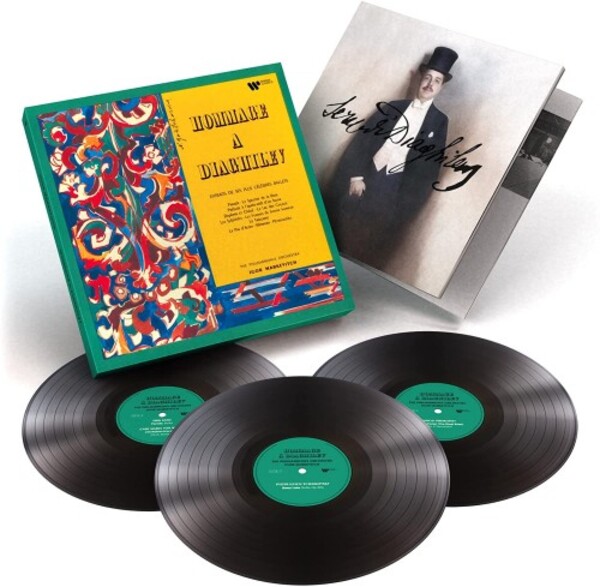
Hommage a Diaghilev (Vinyl LP)
£73.42
Usually available for despatch within 5-8 working days
Despatch Information
This despatch estimate is based on information from both our own stock and the UK supplier's stock.
If ordering multiple items, we will aim to send everything together so the longest despatch estimate will apply to the complete order.
If you would rather receive certain items more quickly, please place them on a separate order.
If any unexpected delays occur, we will keep you informed of progress via email and not allow other items on the order to be held up.
If you would prefer to receive everything together regardless of any delay, please let us know via email.
Pre-orders will be despatched as close as possible to the release date.
Label: Warner
Cat No: 9029641943
Format: LP
Number of Discs: 3
Genre: Orchestral
Release Date: 4th March 2022
Contents
Works
Les Sylphides: Ballet music (arr. Roy Douglas)El sombrero de tres picos (The three-cornered hat)
The Steel Step, op.41
Parade
Petrushka
The Good-Humoured Ladies (Le donne de buon umore): Suite
Invitation to the Dance (Aufforderung zum Tanze), J260 (orch. Berlioz)
Artists
Philharmonia OrchestraConductor
Igor MarkevitchWorks
Les Sylphides: Ballet music (arr. Roy Douglas)El sombrero de tres picos (The three-cornered hat)
The Steel Step, op.41
Parade
Petrushka
The Good-Humoured Ladies (Le donne de buon umore): Suite
Invitation to the Dance (Aufforderung zum Tanze), J260 (orch. Berlioz)
Artists
Philharmonia OrchestraConductor
Igor MarkevitchAbout
Released in addition to the “Diaghilev: Ballets russes” 22-CD boxset, this 3-LP set is the reissue of the 1954 box initiated by Walter Legge, EMI’s famous producer, to commemorate the 25th anniversary of Diaghilev’s death.
The cover reproduces the original illustration purposely designed at the time by Natalia Goncharova, one of the famous set painters of the Ballets russes.
The 32-page booklet, richly illustrated with historical photos and sketches of costumes, sets..., includes the notes from the 1954 edition, in English and French, by Igor Markevitch along with a short excerpt of ‘Le Ballet’ by Boris Kochno, and work presentations by the British dance specialist Cyril W. Beaumont.
31 March 2022 marks the 150th anniversary of the flamboyant, visionary and influential impresario Serge Diaghilev, founder of the legendary Ballets russes.
In 1906 he promoted Russian art and sculpture at the Salon d’automne in Paris, which in the early 20th century was the world’s capital of culture. He continued to be active in Paris: the following year he mounted concerts with such Russian artists as the composers Rimsky-Korsakov, Rachmaninov and Glazunov, and the singers Feodor Chaliapin and Félia Litvinne. In 1908, at the Paris Opéra, he staged Mussorgsky’s opera Boris Godunov with Chaliapin. The designs were by two Russian artists – Leon Bakst and Alexandre Benois – who became closely associated with the Ballets russes company, which Diaghilev founded in Paris in 1909.
For two decades, in a period of rich cultural ferment, dramatic transition and geo-political upheaval, the Ballets russes created a sensation with its innovative fusion of dance, music and design. In 1929, when the company disbanded following Diaghilev’s death, it had played a crucial role in the evolution of the performing and visual arts.
The composer and conductor Igor Markevitch met Diaghilev at the Paris Opéra in December 1928, when he was only sixteen. Diaghilev always on the lookout for new ballet music thought he had found a composer who could give him a score for the next season of the Ballets russes. He commissioned a piano concerto from Markevitch as a test piece, which was premiered by the composer at the piano and conducted by Roger Désormière in London on 15 July 1929 and was a great success. Diaghilev’s unexpected death a month after left the next planned work unfinished. Markevitch was greatly impressed and influenced by Diaghilev and retained a great admiration for him.
Quotations from 1954:
“Dear Mr Walter Legge. You ask me for three sentences. Here is the first: he was the most absolute and the most beloved of tyrants. The second: his reign was the most magnificent in the history of ballet. And the third... Diaghilev would never have allowed it to be written. Sincerely yours.” – Lydia Lopokova, Baroness Keynes (Dancer, 1891-1981: she toured with the Ballets russes in 1910, and rejoined them in 1916 after an interlude in the US.
“Diaghilev’s contribution to the arts of music and ballet was unparalleled in this century. The secret was in his unique personality. He had a rare blend of qualities that allowed him to dominate without constraint, and to fuse the various elements he brought together into a coherent work of art. To Picasso, Bakst, Falla, Stravinsky, Nijinsky, Massine, to name but a few, he knew how to give them the opportunity and breathe his guiding idea into them without ever altering their own genius, but on the contrary exalting it. Among all the specialists, each one absorbed in a part of the work, he always kept the vision of the whole, so that each performance bore the mark of his influence from one end to the other, and his influence radiated on the whole of theatrical art.” – Sir William Walton (composer, 1902-1983)
“What he provoked was the spark of genius. He did it with such intensity that almost all the artists who worked with him with him, produced their best works under his influence. It would be enough to mention the numerous ballets composed by Stravinsky for the Ballets Russes, or Daphnis et Chloé by Ravel, or Parade by Erik Satie. The same applies to the choreographies of Fokine, Nijinsky and Massine, and the sets of Picasso, Braque and Rouault.” – Igor Markevitch (conductor, composer 1912-1983)
Error on this page? Let us know here
Need more information on this product? Click here